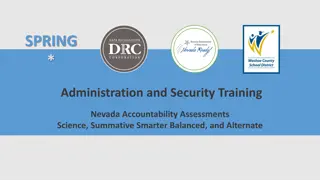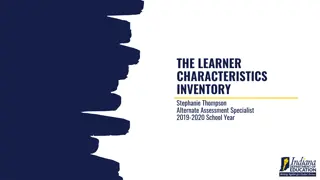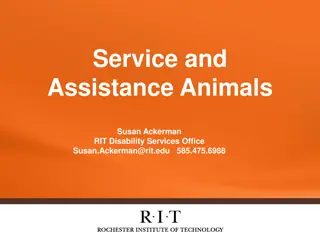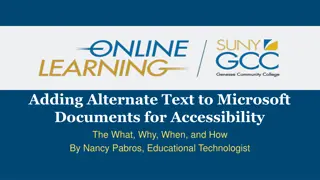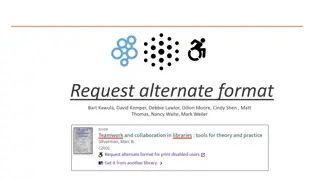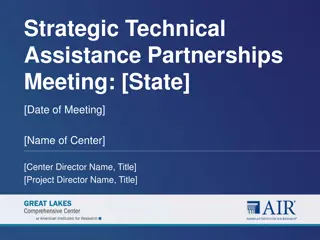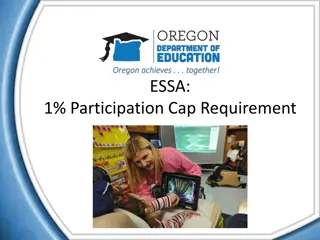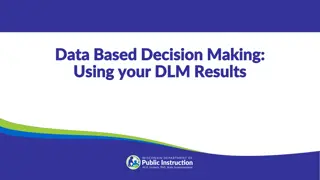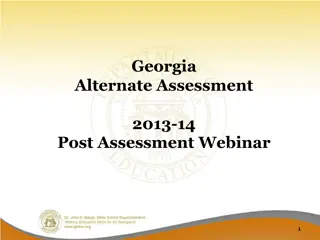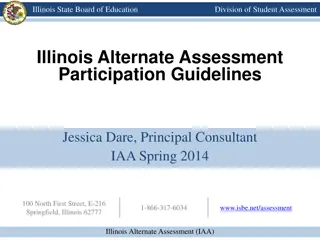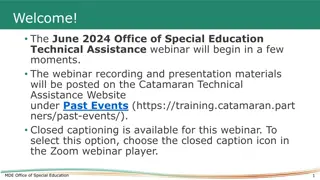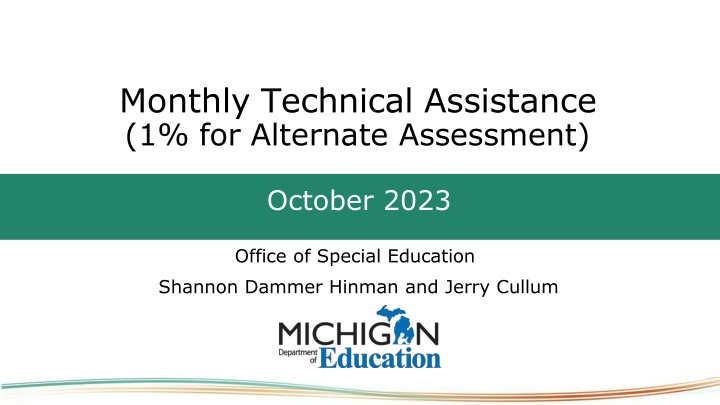
Monthly Technical Assistance for Alternate Assessment | October 2023
Explore the key points discussed in the monthly technical assistance session focusing on the alternate assessment for students with disabilities. Topics include participation criteria, decision-making processes, MI-Access purpose, implications, ESSA requirements, and the significance of state assessments. Gain insights into the 1% cap, assessment objectives, and the purpose of the MI-Access program provided by the Michigan Department of Education's Office of Special Education.
Download Presentation

Please find below an Image/Link to download the presentation.
The content on the website is provided AS IS for your information and personal use only. It may not be sold, licensed, or shared on other websites without obtaining consent from the author. If you encounter any issues during the download, it is possible that the publisher has removed the file from their server.
You are allowed to download the files provided on this website for personal or commercial use, subject to the condition that they are used lawfully. All files are the property of their respective owners.
The content on the website is provided AS IS for your information and personal use only. It may not be sold, licensed, or shared on other websites without obtaining consent from the author.
E N D
Presentation Transcript
Monthly Technical Assistance (1% for Alternate Assessment) October 2023 Office of Special Education Shannon Dammer Hinman and Jerry Cullum
Agenda Welcome and Introductions Purpose of Meeting Assessment Background Information Participation in Assessments Decision Making Process Justification Forms 2 MDE Office of Special Education
Alternate Assessment Participation Michigan Department of Education Office of Special Education's guidance on who should participate in MI-Access. 3 MDE Office of Special Education
Presentation Objectives Purpose of MI-Access Implications for a student who takes the MI- Access Talking with parents about the MI-Access Evidence-based decisions about which students should participate in the MI-Access Importance of students participating in state assessments 4 MDE Office of Special Education
Federal Every Student Succeeds Act (ESSA) All states must adhere to ESSA requirements, including those about state and district assessments. o95% of all students with disabilities must participate in state assessments o no more than 1% of students with disabilities may participate in the alternate assessment, by subject area, across all grades o only students with the most significant cognitive disabilities may participate in the alternate assessment 5 MDE Office of Special Education
1% Cap: Where Have We Been? Where Are We Headed? 3% 2% 1% 0% Projected SP21 SP17 SP18 SP19 SP22 SP23 Future 6
Alternate Assessment Purpose The MI-Access is: o one part of our state's assessment system for school-age children. o the MI-Access is designed specifically for those students with "the most significant cognitive disabilities." o based on alternate achievement standards, which means the performance expected is different. MDE Office of Special Education 7
ESSA: The 95% Participation Requirement ESSA requires that states assess 95% of all students and 95% of each subgroup in every school with federally mandated annual state tests in English and math. Michigan did not meet this requirement in 2022, which led to the denial of a waiver extension request in 2023. MDE Office of Special Education 8
Importance of Participating in Assessments Gauge learning & provide feedback Participation in state assessments is a matter of educational equity Balance validity of assessments with equity of access for all students MDE Office of Special Education 9
What Impacts Participation Rates? Lack of communication Assessment information and misinformation Level of understanding about the purpose of the test Adult attitudes/perceptions about standardized testing in general, standardized annual state assessments or Smarter Balanced, in particular. Concerns about too much testing/loss of instructional time Student test anxiety MDE Office of Special Education 10
Administrator Roles in Improving Participation Provide staff talking points on purpose of assessment Communicate expectations with school staff about modeling a positive attitude Establish an orderly testing plan and positive testing environment Make state assessment part of the academic culture oEmploy student voice in this work oCollaborate with faculty and celebrate successes with faculty and students before and after testing MDE Office of Special Education 11
Teacher Roles in Improving Participation Communicate with students and families about annual assessments Model a positive attitude about the test Encourage students to do their best Ensure students understand the purpose of the test and why it is important Explain how the results are used MDE Office of Special Education 12
ESSA: The 1% CAP Requirement ESSA: The 1% CAP Requirement The purpose of the requirement is about the right student taking the most appropriate assessment. The intent is to ensure, unless a student's disability is significant, all students with disabilities should be participating in the general assessment. MDE Office of Special Education 13
Implications for Students Short-term: Student's instruction is in less depth, breadth, and complexity than the instruction of other students and is aligned to alternate content expectations Long-term: Student may not meet the requirements or graduate with a regular diploma Longer-term: Student may not be eligible for some post-secondary training institutions, military service, or jobs. Economic impact to life- time earnings MDE Office of Special Education 14
Implications for Districts ESSA requires districts with more than 1.0% participation in the alternate assessment in a subject area to provide to the state: oAssurance that Individualized Education Program (IEP) Teams are adhering to the state's participation guidelines oJustification for a participation rate over 1.0% oAssurance that parents are informed about implications for their child of participation in the alternate assessment MDE Office of Special Education 15
ESSA: The Most Significant Cognitive Disabilities Requirement Only those students with the "most significant cognitive disabilities (MSCD)" Roughly only half of students with a primary disability of Cognitive Impairment, Autism, Traumatic Brain Injury, or Severe Multiple Impairment meet the requirements of a student with the MSCD The decision about which students should participate in the alternate assessment is often very difficult MDE Office of Special Education 16
Definition of "Most Significant Cognitive Disability" Students with the most significant cognitive disabilities, for the purpose of determining instructional targets and state assessment selection, have a disability or multiple disabilities that significantly impact intellectual functioning AND Significantly impact adaptive behaviors, which are essential to live independently and to function safely in daily life. When adaptive behaviors are significantly impacted, the individual is unlikely to develop the skills necessary to live independently and function safely in daily life. AND Significant cognitive disabilities impact students both in and out of the classroom and across multiple life domains, including academic domains. This means that the students have extensive support needs to demonstrate learning and generalize skills across academic and life settings. AND Students with the most significant cognitive disabilities are supported with an Individualized Education Program (IEP) and the primary instruction and summative educational goals are based on Michigan s alternate content standards in English language arts (ELA), mathematics, science and/or social studies. MDE Office of Special Education 17
Which Students Should Participate (Continued) Never make a decision based on disability/eligibility alone Never make a decision based on one piece of data Must consider curriculum and instruction MDE Office of Special Education 18
Student Participation The majority of students will participate in general assessments (M-STEP and MME) oStudents who participate fully in the general education curriculum without identified disabilities will participate in the general assessment with or without accommodations oMost students with disabilities will be able to participate in the M-STEP and MME when provided with standard, appropriate accommodations MDE Office of Special Education 19
Responsibilities The IEP team has two responsibilities by law oDetermine the appropriate assessment for the student oDetermine which accommodations (if any) are necessary for the student MDE Office of Special Education 20
National Data on Disability Categories MDE Office of Special Education 21
Michigan Data MDE Office of Special Education 22
State Guidelines Across the U.S. Student's disability significantly affects o intellectual functioning and o adaptive behavior Student requires extensive, direct, and individualized instruction and supports that are not temporary or transient in nature Student uses substantially adapted materials and individualized methods of accessing materials Student's instruction is based on alternate academic achievement standards MDE Office of Special Education 23
State Guidelines Alternate Assessment Inclusion Criteria 1. Have an IEP 2. Substantial deficit in cognitive functioning (CF) AND 3. Substantial deficit in adaptive functioning (AF) in daily life domains of conceptual, social, and practical skills 4. Have extensive support needs to demonstrate growth or to generalize learning across academic and life settings 5. Majority of instruction and educational goals in a subject within Michigan salternate achievement expectations MDE Office of Special Education 24
Assessment Selection Guidance MDE Office of Special Education 25
Participation Decision-Making Process IEP Teams are the frontlines in making the decision about which assessment a student takes. Parents and guardians are key to the decision and have unique insight into their children's adaptability and support needs for daily living. School professionals should not make decision without parent or guardian input. IEP Teams need training, resources, and valid, criterion-relevant data to help with making the participation decision. MDE Office of Special Education 26
Communication with Parents and Guardians Listen to them and respect their views. Treat them as equal partners in the education of their child. Use interpreters to bridge potential cultural and linguistic barriers . When an alternate assessment is selected, notice should reflect consideration of the general assessment and reasons not selected. Requirement: Must inform parents of the standards their child is participating and potential impact on ability to graduate high school. MDE Office of Special Education 27
Justification Forms MDE Office of Special Education 28
When Completing the Justification Form, Please Note the Following Contributing factors, when they apply, do not change the 1% rule, but provide additional context for member districts to think about their data. A space is provided for other justifications. This is an opportunity for the member district to hypothesize any other factors contributing to participation rates. Disproportionality must be addressed, only when a member district has been flagged. MDE Office of Special Education 29
What is Required on a District Form? Justification Forms require member districts to demonstrate a thorough review of alternate assessment participation rates when participation rates exceed 1%. Some areas to consider, could include but are not limited to: oStudents taking the Functional Independence level assessment. oAlignment between instructional standards taught and assessment selected. MDE Office of Special Education 30
Disproportionality States must address and verify disproportionality in the identification of students with the MSCD. oMust look at differences in the proportions of the students in each subgroup who participated in the alternate assessment compared to the proportion of all other students. For example: Race and/or ethnicity Socio-economic status MDE Office of Special Education 31
Considerations to Include on a District Form (Continued) Differences in participation between one building and another, or one staff member s caseload and another. Eligibility areas not typical for alternate assessments (if known). Students who consistently perform at exceeds standards level. MDE Office of Special Education 32
Technical Assistance MDE will provide recommended targeted assistance to the ISD for any district that falls into one or more of the following categories: A participation rate of 1.4% or higher Flagged for disproportionality Required a response to something indicated in the justification form Districts falling into these categories are required to have a plan to address participation rates and should receive technical assistance from the ISD. MDE Office of Special Education 33
2023-2024 Levels of Support Tier One = 1.1% - 1.3% or basic disproportionality Tier Two = 1.4% -2.6% or disproportionality with 1.1% - 1.3% overall Tier Three = 2.7% and above or disproportionality of 1.4% - 2.6% overall MDE Office of Special Education 34
ISD and Member District Reminders The Justification Forms activity will be completed by ISD directors and/or monitors and district catamaran coordinators in Catamaran. All district justification forms must be reviewed and accepted before ISDs can submit the ISD Summary Justification Form. District Justification Forms only need to be completed by ISDs if they are operating one or more center-based programs. MDE Office of Special Education 35
Training Resource Content Policy resources are located by selecting the Other Resources menu and then choosing the appropriate page such as District or ISD Policy Resources. MDE Office of Special Education 36
Justification Forms for Districts How To MDE Office of Special Education 37
Justification Forms for ISDs How-To MDE Office of Special Education 38
Search Function Search the entire technical assistance website Enter a key word or phrase and choose Search Narrow search by choosing a category, if desired MDE Office of Special Education 39
Release Date and Due Dates A webinar on justification forms will be recorded November 2, 2023, and posted on the Catamaran Training Site. Justification forms will be released in Catamaran November 7, 2023 oThe due date for LEAs is Tuesday, December 12, 2023 oThe due date for ISDs is Tuesday, January 23, 2023 MDE Office of Special Education 40
Contact Information Shannon Dammer-Hinman MDE OSE HinmanS@Michigan.gov 517-335-1662 Jerry Cullum, PhD Education Research Consultant MDE OEAA CullumJ@Michigan.gov MDE-OSE Information Line Interpreter Services Available MDE-OSE@Michigan.gov 1-888-320-8384 MDE Office of Special Education 41


